A gold prospectors' camp at the foothills in California during the Gold Rush.
Act I
Dusk. In the Polka saloon, things are getting lively: the miners are assembling after their day's work. They are playing cards, exchanging news and ordering drinks and cigars. The bartender Nick is busy with his customers. The game stops when the local bard Jake Wallace sings a melancholy song and plunges everyone into nostalgia. Jim Larkens cannot stop crying; he is sick to the back teeth of this life and wants to go home. The lads all chip in to pay for his journey. Those playing cards discover a cheat and are ready to attack him. Sheriff Rance attaches a marked card to Sid's chest as a mark of shame and steers him out of the saloon. The Wells Fargo agent Ashby drops into the Polka and relates how his hunt for a band of Mexican bandits headed by Ramerrez is progressing. Meanwhile, a quarrel flares up between the sheriff and the prospector Sonora: both are claiming the favour of Minnie, the saloon's owner. A fight ensues. At the very height of the struggle, a revolver goes off – it is Minnie. The prospectors greet the beauty in delight. In order to atone for their guilt in what has happened, they bring her presents. The men gather around the girl for a lesson – to hear the Bible read.
The pony express arrives with letters. Ashby is delighted with a message he has received: Ramerrez' lover tells him where the bandit will be that night. The prospectors all read their letters from family, while Nick tells of a peculiar stranger outside who is asking for whiskey and soda. Left alone with Minnie, the sheriff hastens to pour out his feelings. He admits that he has never loved anyone, but that now he would surrender all his treasure for just one kiss from her. Minnie dreams of another life, and she remembers her parents. The appearance of the stranger who calls himself Dick Johnson (it is actually Ramerrez) interrupts their conversation. The stranger recognises in Minnie the girl he once met on the road to Monterey. Neither has she forgotten him. Rance is filled with suspicion, and he jealously watches Minnie dancing with the stranger.
A noise is heard outside. Ramerrez' accomplice José Castro has been caught. He promises to take the sheriff to the bandit's lair, and secretly tells Johnson that the band is prepared, they just have to wait until there is no-one left in the saloon. A storm begins, but the sheriff and the gold prospectors nevertheless intend to catch the bandit. Minnie is happy that this new friend will stay with her in the empty saloon. She admits to him that the prospectors store the gold they have found there. "I'm just a poor girl," Minnie laments about her lack of education, and says that she dreams of being as erudite as her interlocutor. She tells of the hard labour of the gold prospectors, of their woes and of the families they have left behind. Johnson abandons his criminal plans: he cannot rob a girl he has loved. He must leave, and Dick asks permission to accompany her home.
Act II
In Minnie's hut her helper, Wowkle the Red Indian, is discussing the forthcoming wedding with her friend Billy Jackrabbit, which will take place at the insistence of her mistress.
Minnie orders Wowkle to set the table for two, herself hurrying to doll herself up: today there will be a guest in the house. A snowstorm can be seen outside the window. Johnson arrives. There is the joy of their meeting and Minnie's first kiss. Dick cannot reveal the truth about himself and wants to go, but the girl makes him stay. He must stay the night, and wait for the bad weather to pass. Suddenly voices can be heard outside. It is Rance, Nick, Sonora and Ashby; they have followed Ramerrez' trail here. Dick listens from his place of concealment and hears them telling Minnie that Johnson and Ramerrez are the same man and that he was revealed to them by his lover Nina Micheltorena. The girl is stunned by this news. Nick notes the presence of a guest in the house, but does not voice his suspicions. The men leave with nothing.
Minnie is insulted and hurt: she has chosen a bandit for a lover and has been deceived. Johnson begs her to hear his story. After his father's death he truly had to become a bandit to feed his family. Meeting Minnie has let him dream of peaceful happiness, but now all is finished. The girl is ready to forgive the bandit, but not to forgive a man who stole her first kiss through deception. She shows him the door. A shot is heard.
Minnie hurries to help her beloved, and before the sheriff arrives she manages to conceal Dick in the attic. To Rance, who has come for his prey, the girl declares resolutely that she is alone. Rance prepares to leave when suddenly a spot of blood drips down from the attic. Seized with fury, the sheriff forces the wounded man downstairs. Johnson loses consciousness. Minnie resorts to a trick in despair: she asks Rance, a confirmed gambler, a game of poker. If he wins, he will get her and Johnson, and if she wins Dick will remain with her. At the decisive moment, the girl cheats at cards. Rance leaves, concealing his thirst for revenge. Minnie rushes to Dick.
Act III
Rance and Nick are sad, awaiting news of Ramerrez' capture. Nick consoles the sheriff, telling him of his noble act concerning Minnie. She tended to Ramerrez, and he is again on the run. Shouts of the pursuers can be heard. Ashby rubs his hands: this time the criminal will not get away. The sheriff looks forward to his revenge. Ultimately, it is Sonora who succeeds in capturing the fugitive. The men dance joyfully: now they will have justice. Nick secretly warns Billy Jackrabbit who is preparing a noose not to hurry in hanging Ramerrez. The criminal listens to the accusation before the crowd. His is given a chance to speak, and Dick asks for Minnie not to be told of his involvement: let the girl believe that he has chosen the path of correction and has gone far away. The girl tenderly turns to the prospectors, convincing them that the bandit Ramerrez was is dead, that there is not a sinner in the world to whom the path to redemption would not be open. She reminds her customers how she has cared for them. Speaking for all, Sonora grants the criminal his life and freedom. Minnie and Johnson bid farewell to the brothers and California.
Time:1849 to 1850.
Place: A mining camp at the foot of the Cloudy Mountains, California.
Act 1
Inside the Polka Saloon
A group of Gold Rush miners enter the "Polka" saloon after a day working at the mine ("Hello! Hello! Alla 'Polka'"). After a song by traveling minstrel Jake Wallace ("Che faranno i vecchi miei"), one of the miners, Jim Larkens, is homesick and the miners collect enough money for his fare home ("Jim, perchè piangi?").
A group of miners playing cards discover that Sid is cheating and want to attack him. Sheriff Jack Rance quiets the fight and pins two cards to Sid's jacket, as a sign of a cheat.
A Wells Fargo agent, Ashby, enters and announces that he is chasing the bandit Ramerrez and his gang of Mexicans. Rance toasts Minnie, the woman who owns the saloon, as his future wife, which makes Sonora jealous. The two men begin to fight. Rance draws his revolver but at that moment, a shot rings out and Minnie stands next to the bar with a rifle in her hands ("Hello, Minnie!"). She gives the miners a reading lesson from the Bible ("Dove eravamo?").
The Pony Express rider arrives ("La posta!") and delivers a telegram from Nina Micheltorena, offering to reveal Ramerrez's hideout. The sheriff tells Minnie that he loves her, but Minnie puts him off as she is waiting for the right man ("Ti voglio bene, Minnie").
A stranger enters the saloon and asks for a whisky and water. He introduces himself as Dick Johnson from Sacramento, whom Minnie had met earlier. Johnson invites Minnie to dance with him and she accepts. Angrily, Rance watches them.
Ashby returns with the captured Ramerrez gang member, Castro. Upon seeing his leader, Johnson, in the saloon, Castro agrees to lead Rance, Ashby and the miners in a search for Ramerrez, and the group then follows him on a false trail and in what turns out to be a wild goose chase. But before Castro leaves, he whispers to Johnson that somebody will whistle and Johnson must reply to confirm that the place is clear. A whistle is heard, but Johnson fails to reply.
Minnie shows Johnson the keg of gold that she and the miners take turns to guard at night and Johnson reassures her that the gold will be safe there. Before he leaves the saloon, he promises to visit her at her cabin. They confess their love for each other. Minnie begins to cry, and Johnson comforts her before he leaves.
Act 2
Minnie's dwelling, later that evening
Wowkle, a Native American woman who is Minnie's servant, her lover Billy Jackrabbit and their baby are present as Minnie enters, wanting to get ready for Johnson's visit. Johnson enters Minnie's cabin and she tells him all about her life. It begins to snow. They kiss and Minnie asks him to stay till morning. He denies knowing Nina Micheltorena. As Johnson hides, a posse enters looking for Ramerrez and reveal to Minnie that Johnson is the bandit Ramerrez himself. Angry, she orders Johnson to leave. After he leaves, Minnie hears a gunshot and she knows Johnson has been shot. Johnson staggers in and collapses, Minnie helps him by hiding him up in the loft. Rance enters Minnie's cabin looking for the bandit and is about to give up searching for Johnson when drops of blood fall on his hand. Rance forces Johnson to climb down. Minnie desperately makes Rance an offer: if she beats him at poker, he must let Johnson go free; if Rance wins, she will marry him. Hiding some cards in her stockings, Minnie cheats and wins. Rance honors the deal and Minnie throws herself on the unconscious Johnson on the floor.
Act 3
In the Great Californian Forest at dawn, sometime later
Johnson is again on the run from Ashby and the miners. Nick and Rance are discussing Johnson and wonder what Minnie sees in him when Ashby arrives in triumph: Johnson has been captured. Rance and the miners all want Johnson to be hanged. Johnson accepts the sentence and only asks the miners not to tell Minnie about his capture and his fate ("Ch'ella mi creda"). Minnie arrives, armed with a pistol, just before the execution and throws herself in front of Johnson to protect him. While Rance tries to proceed, she convinces the miners that they owe her too much to kill the man she loves, and asks them to forgive him ("Ah! Ah! E Minnie!"). One by one, the miners yield to her plea ("E anche tu lo vorrai, Joe"). Rance is not happy but finally he too gives in. Sonora unties Johnson and sets him free. The miners bid Minnie farewell ("Le tue parole sono di Dio"). Minnie and Johnson leave California to start a new life together.


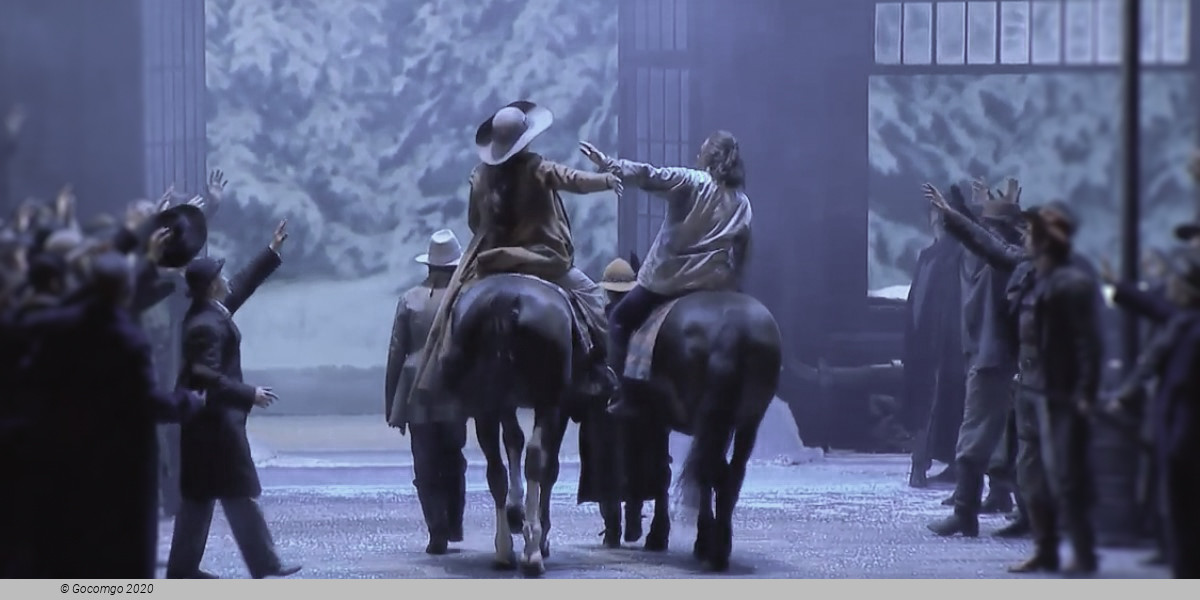
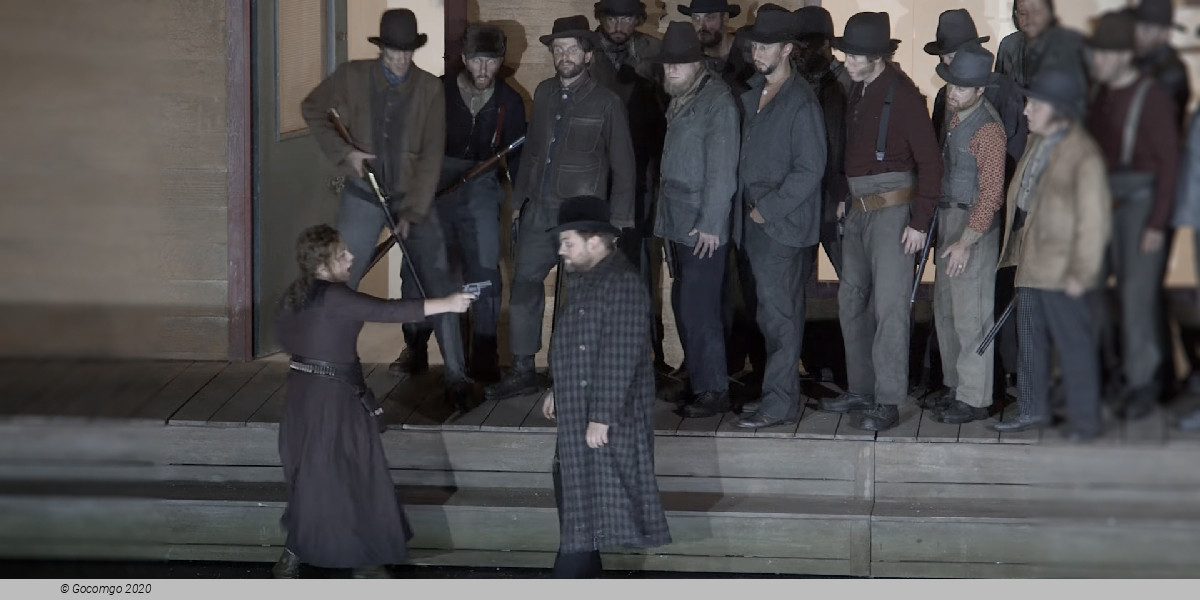
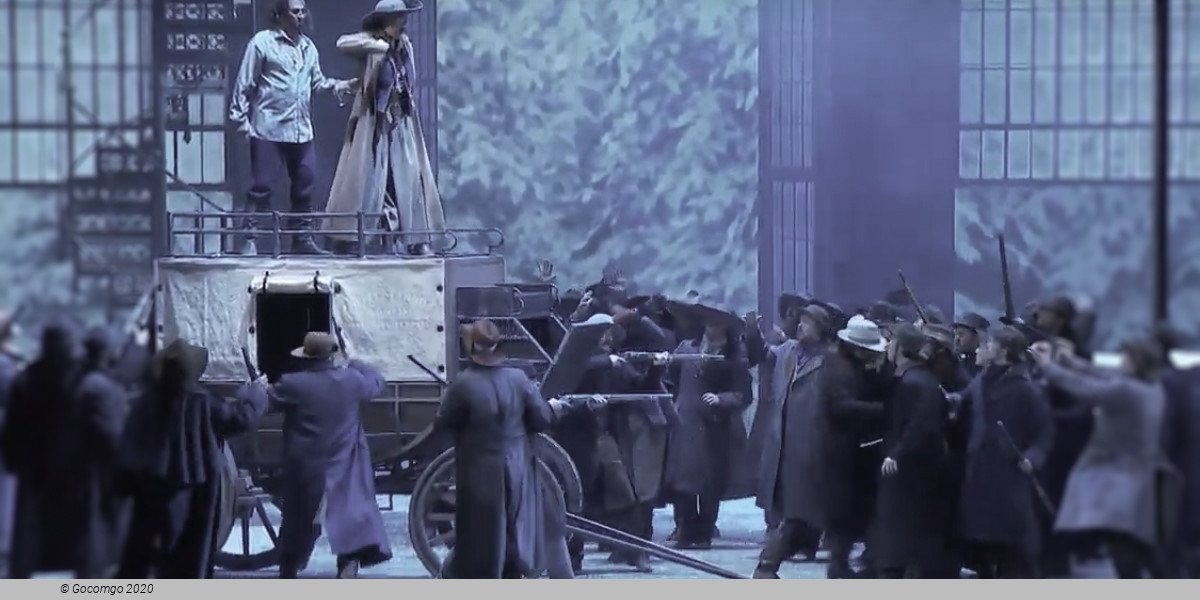
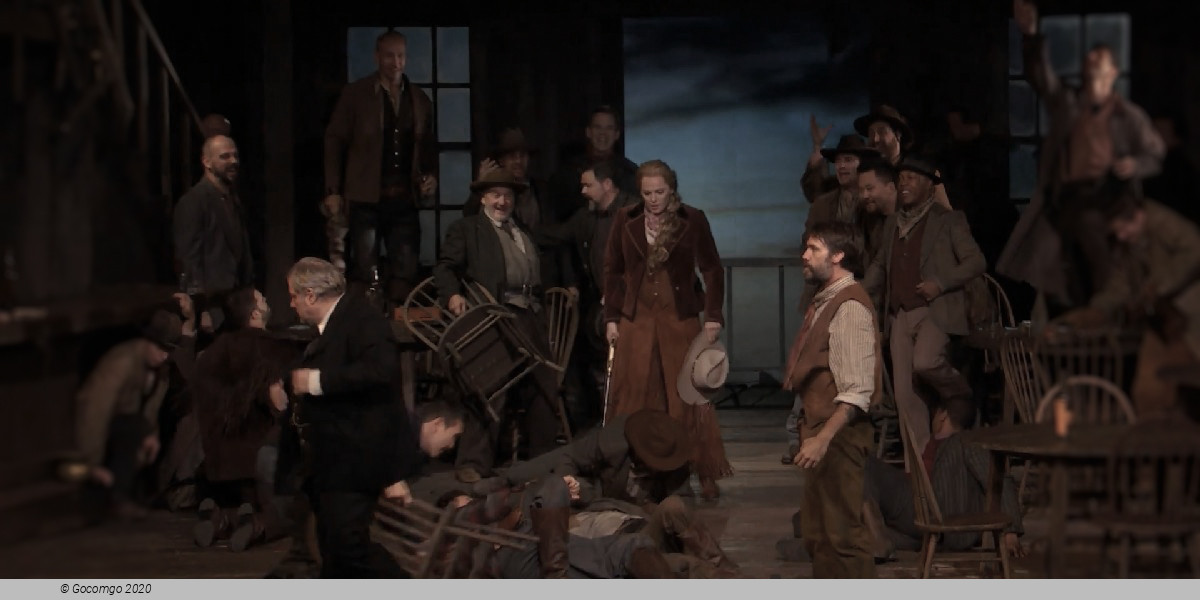
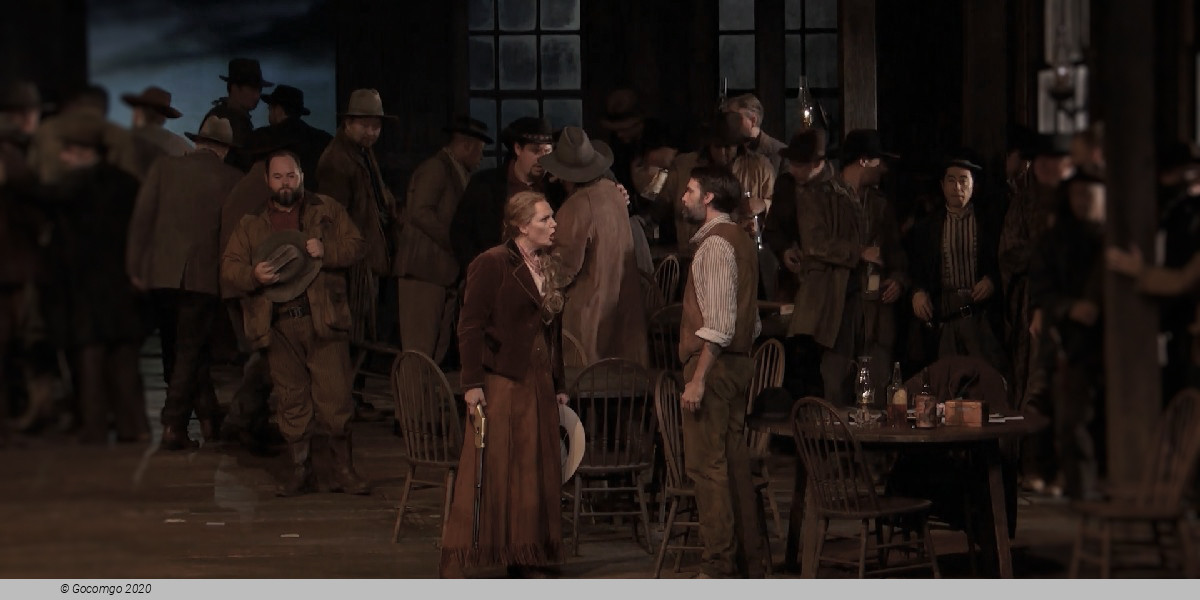
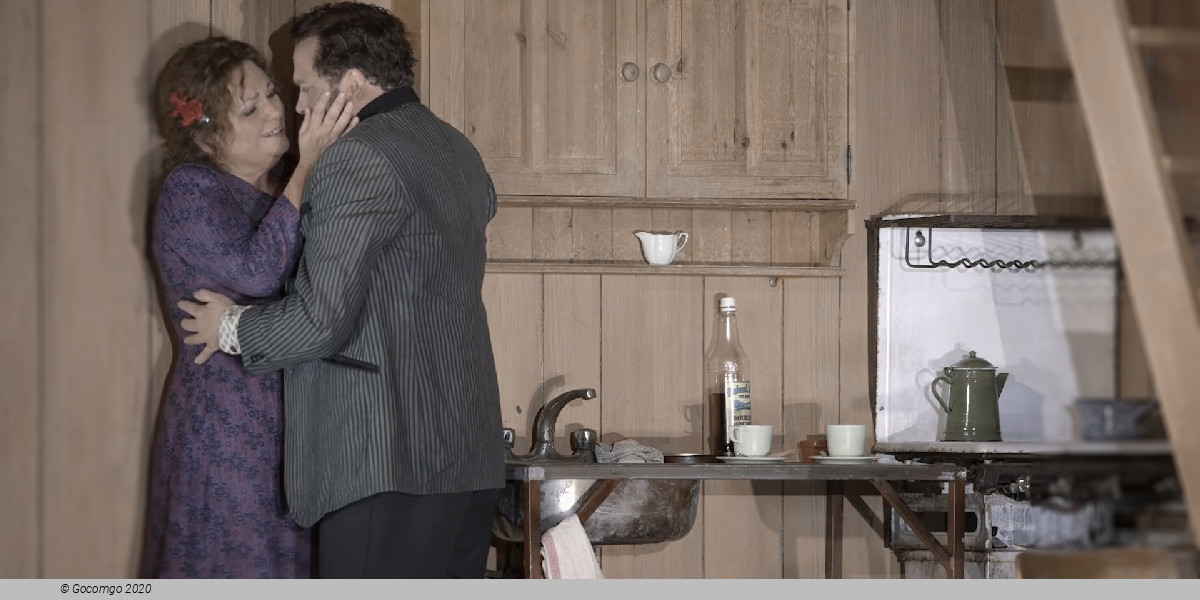
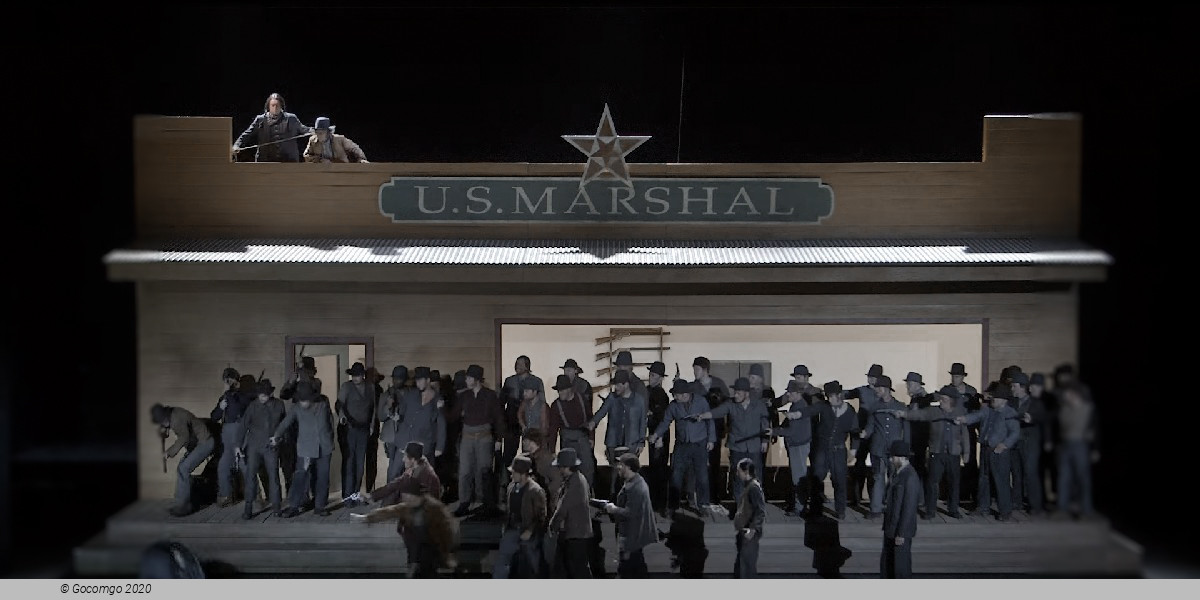
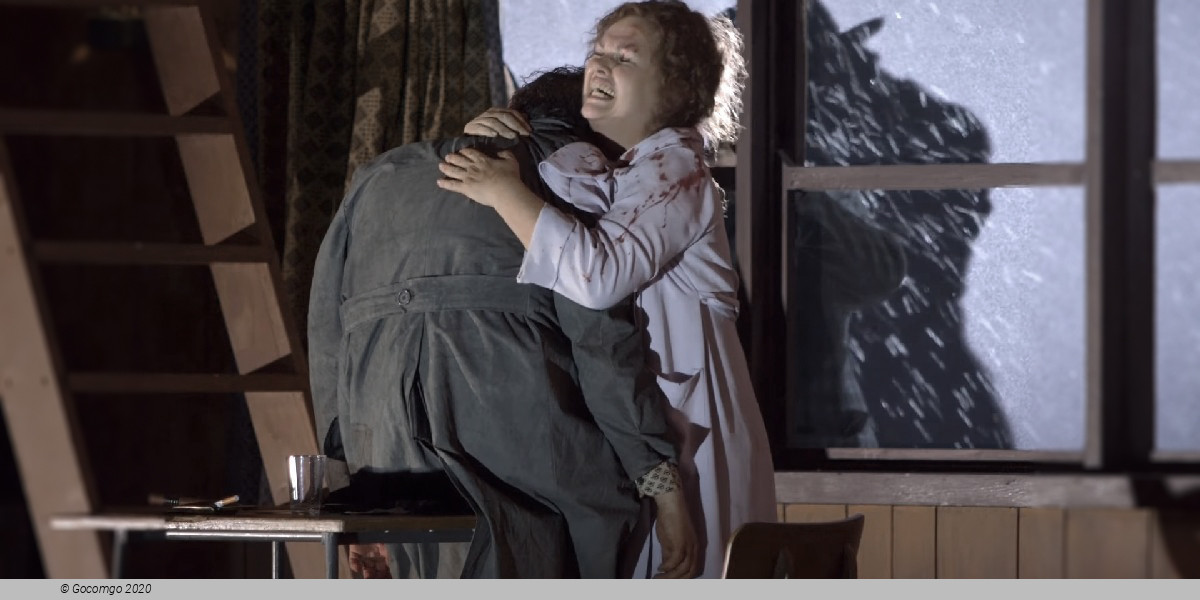
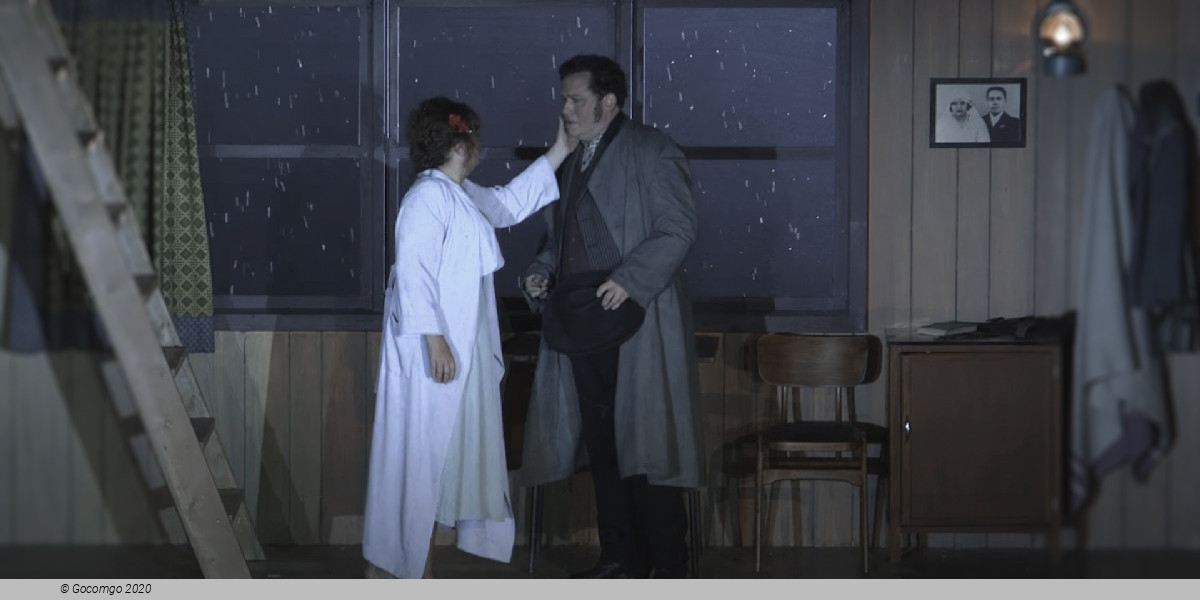
 1 Theatre Square
1 Theatre Square